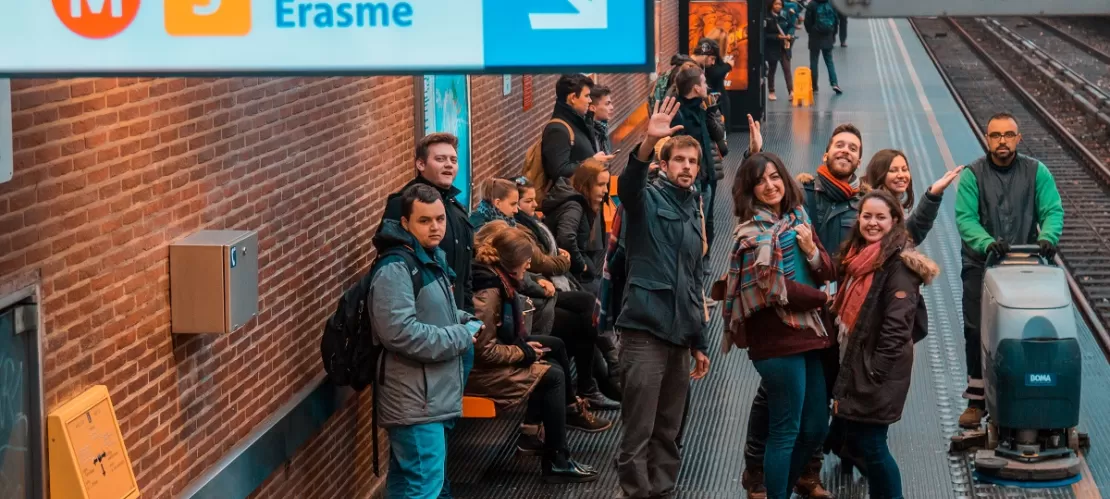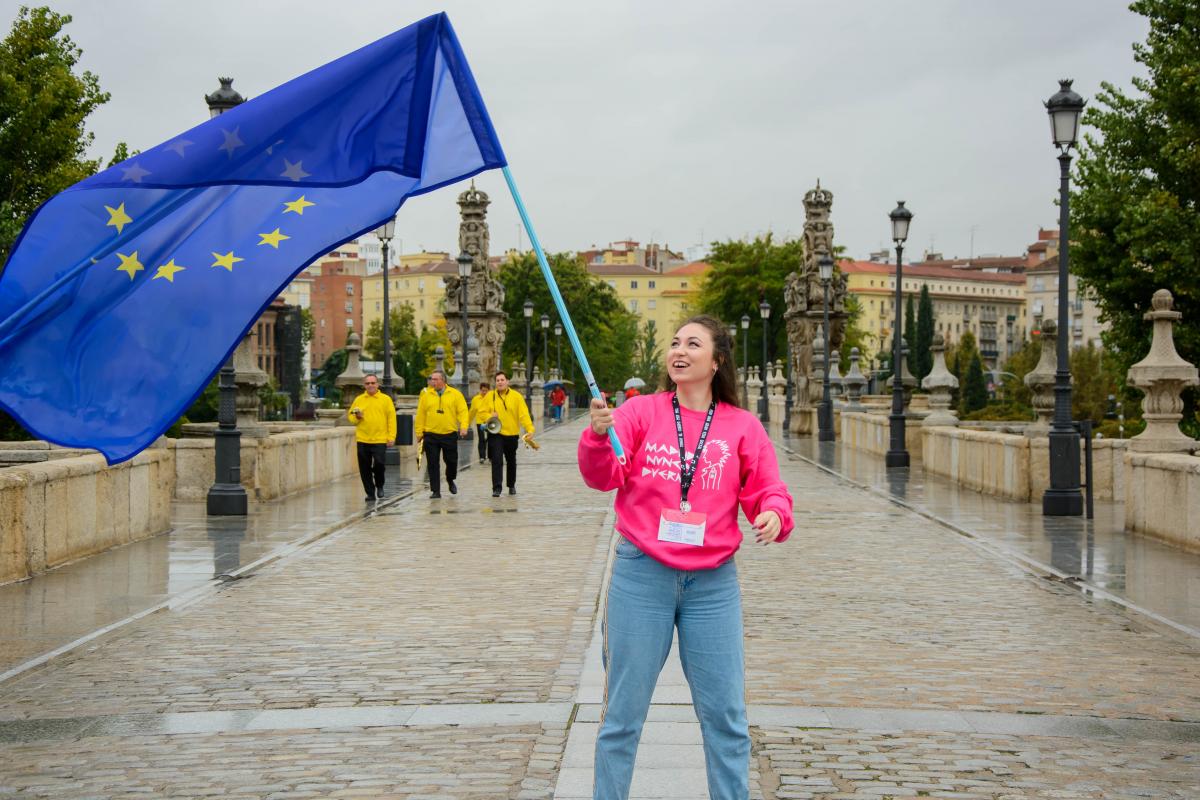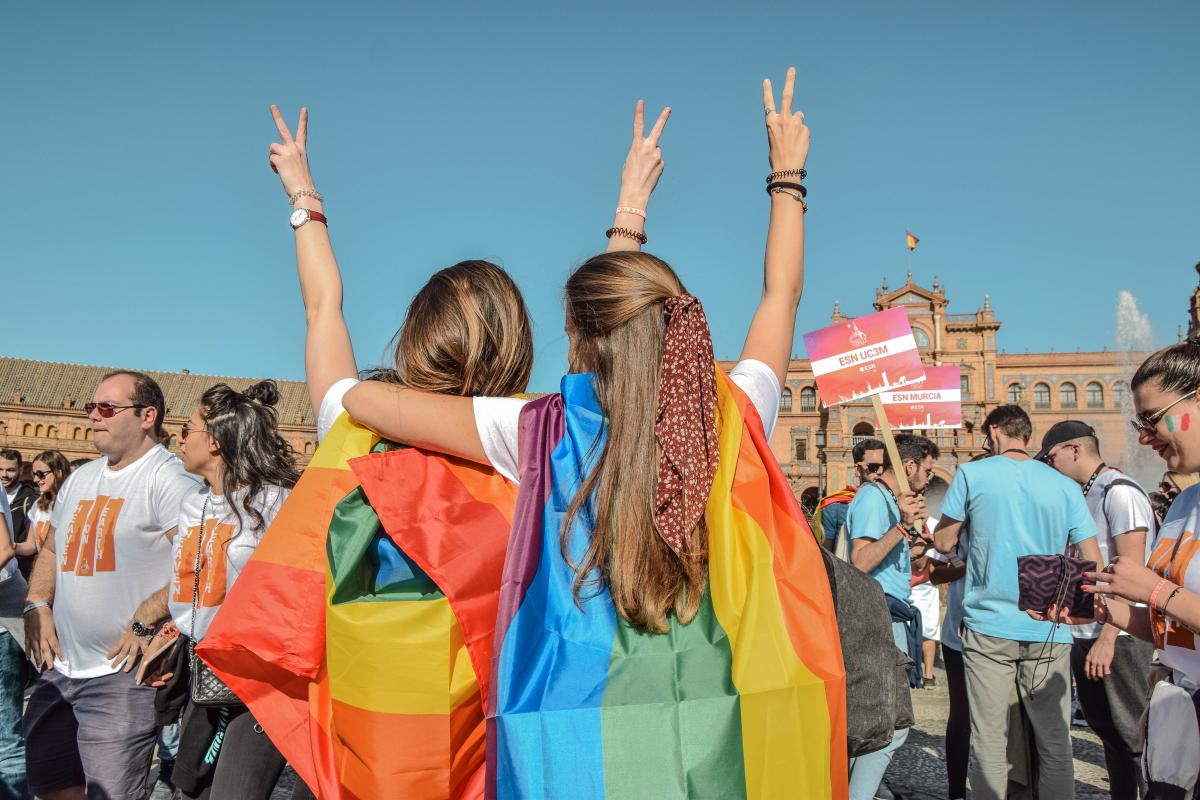
Erasmus+ is one of the most successful programmes of the European Union and, since 1987, brings people together, promotes cultural exchange and peace all over the world and whether you are just starting high school, enrolling at university or a staff member in a Higher Education Institution, you have the right to apply to participate in the Erasmus+ Programme activities. However, looking for all answers in one place can be challenging, so we gathered and answered the most googled questions for you.
Why is the Erasmus+ Programme called Erasmus+?
The programme is named after the Dutch philosopher Desiderius Erasmus of Rotterdam, which is also an acronym that stands for European Region Action Scheme for the Mobility of University Students.
What is the plus in Erasmus+?
The Erasmus Programme (2009-2013) focused on student and staff mobility between universities. The Erasmus+ Programme (2014-2020) still focuses on higher education student mobility but it also includes opportunities to study, train or volunteer abroad for vocational students, apprentices, teachers, youth workers and volunteers. Therefore, the plus in Erasmus+ indicates that the programme lasting from 2014 to 2020 is inclusive and includes a wide range of activities for all levels of education and staff mobility.
How does the Erasmus+ Programme work?
Erasmus+ is the EU's programme to support education, training, youth and sport in Europe and it is managed by the European Commission, the Education, Audiovisual, and Culture Executive Agency, a series of National Agencies in Programme countries, and a series of National Offices in some Partner countries.
What are the objectives and features of the Erasmus+ Programme?
The general objective of the Programme is the sustainable development of Partner Countries in the field of Higher Education, developing the European dimension in sport and promoting European values. However, multilingualism is one of the cornerstones of the European project and a powerful symbol of the EU's aspiration to be united in diversity. Other important features of the Programme are the recognition and validation of skills and qualifications, promoting open access of project outputs to support learning, teaching, training, and youth work, and finally promoting equity and inclusion by facilitating access to participants from disadvantaged backgrounds and fewer opportunities.
Which projects does the Erasmus+ programme include?
In order to achieve its objectives, the Erasmus+ Programme implements three different key actions. Mobility of individuals is the first key action and is focused on Mobility of learners and staff, Erasmus Mundus Joint Master Degrees and Erasmus+ Master Loans. The second key action, Cooperation for innovation and the exchange of good practices, supports Strategic Partnerships, Knowledge Alliances, Sector Skills Alliances, Capacity-building, and IT support platforms such as eTwinning, European Platform for Adult Learning (EPALE), European Youth Portal and since 2018, the European Virtual Exchange. The last key action, Support for policy reform, focuses on improving knowledge in the fields of education, training and youth, initiatives and support for policy innovation, and promotion.
In addition, the Erasmus+ Programme supports the Jean Monnet Activities that aim at promoting excellence in teaching and research in the field of European Union studies worldwide and fostering the dialogue between the academic world and society.
Besides education, innovation and youth, Erasmus+ also supports actions in Sport that include Collaborative Partnerships and Not-for-profit European sport events, and as of 2017, the European Commission organises the European Week of Sport with a goal of promoting sport and physical activity.
For more information about how the programme works and its key figures visit ec.europa.eu/programmes/erasmus-plus/about_en or read the Erasmus Programme guide.

How to apply for Erasmus+?
Erasmus+ is open to many individuals and organisations, although eligibility varies from one action to another and from one country to another. You have a possibility of studying or doing an internship abroad in another country for a period of at least 2 months and a maximum of 12 months per cycle of studies.
To apply, go through the International or Erasmus+ Office of your Higher Education Institution and ask for the form to apply. Once selected, you will sign a Grant Agreement with your sending institution (even if you do not receive financial support from EU funds), and a Learning Agreement with your sending and receiving institution.
For more about Erasmus+ grants look here ec.europa.eu/education/study-in-europe/planning-studies/scholarships-costs_en
How many participants does the Erasmus+ Programme have?
The Erasmus Programme was established in 1987 and is among the most popular EU programmes in education and training. During its first year, only 3,244 students went abroad and the programme involved only 11 countries — Belgium, Denmark, Germany, Greece, France, Ireland, Italy, Netherlands, Portugal, Spain and the United Kingdom. What started as a student exchange programme in 1987, has grown into something bigger and enriched the lives of more than 9 million direct participants. Each year, more than 300,000 students now study or train under the Erasmus+ umbrella.
How does Online Language Support work?
Online Language Support (OLS) provides participants in Erasmus+ and European Solidarity Corps long-term mobility activities with the opportunity to assess their knowledge of the main mobility language, before and after their stay abroad. If they so wish, participants also have the opportunity to follow an online language course to improve their language level, before and during their mobility.
Why is the Erasmus+ Programme important and why should you study abroad?
Studying abroad is an amazing experience. It is unique from a personal as well as an academic point of view. Being in an international environment for a few months is the best opportunity to establish intercultural contacts, obtain valuable insight into a different culture, learn a language and grow as a person. Moreover, over the past 32 years, the programme has allowed a whole generation to informally learn what it means to live and work alongside people from another culture, and to develop the skills and versatility that are vital for the modern labour market.
Why should you apply for an Erasmus+ traineeship?
Erasmus+ supports traineeships (work placements, internships, etc.) abroad for students currently enrolled in Higher Education Institutions in Programme countries at Bachelor and Master level as well as for doctoral candidates. These opportunities are also open to recent graduates. Going abroad for an internship is the perfect opportunity not only to strengthen your CV, but also to improve your social skills while learning how to become more independent.
Everything you need to know about traineeships esn.org/blog/everything-you-need-know-about-erasmus-traineeships
Is the Erasmus+ Programme only for students from the European Union?
Individuals can take part in many of the opportunities funded by Erasmus+, although most will have to do so through an organisation taking part in the programme. The eligibility of individuals and organisations depends on the country in which they are based. Countries that are eligible to participate in the programme are divided into two groups, Programme countries and Partners countries. Although Programme countries are eligible for all actions of Erasmus+, Partner countries can only take part in some and are subject to specific conditions.
Check the list of countries that can take part ec.europa.eu/programmes/erasmus-plus/about/who-can-take-part_en
Does Erasmus+ help with employability?
Recent studies have shown Erasmus+ enhances students’ quality of life and career prospects, both during their course abroad and long after it finishes and it helps students discover what they want to do after their studies. Furthermore, 80% of Erasmus+ graduates are employed within three months of graduation, with 72 per cent stating their Erasmus+ experience helped them land their first job. Nearly half of Erasmus+ trainees were offered a job in the company where they trained.
For more information on employability and internationalisation of students taking part in mobility programmes check the Erasmus Impact Study.
Can you participate in the Erasmus+ Programme more than once?
Yes. You can do a study period abroad or a traineeship up to 12 months during EACH study cycle: Bachelor, Master, and as a doctoral candidate.

What is an Erasmus+ youth exchange?
Youth Exchanges are organised for groups of young people from different countries in order to meet, live together and work on shared projects for short periods. Usually, youth exchanges last between 5 and 21 days. To participate in a youth exchange, you cannot apply directly for a grant as an individual. Applications must be made by an organisation or a group of young people who in turn select who will participate in the exchange.
Look for training courses at salto-youth.net/tools/european-training-calendar
What is #DiscoverEU?
The European Union is offering travel passes for you to explore it’s cultural diversity, to connect with other Europeans, and for you to enjoy the advantages of the freedom of movement. If you are 18 years old you are eligible to travel for a minimum 1 day and up to 30 days. The next application round will be open in spring 2020 on the European Youth Portal.
Check for updates on the next open call europa.eu/youth/discovereu_en
What is the European Solidarity Corps and how is it related to Erasmus+?
The European Solidarity Corps is an initiative that embraces actions from Erasmus+ and receives funding from it. It creates opportunities for young people to volunteer or work in projects - in their own country or abroad - that benefit communities and people around Europe. Participants aged 18-30 can be placed with a project either for volunteering or for a traineeship, an apprenticeship or a job for a period between 2 and 12 months.
If you are up for a challenge, and willing to dedicate yourself to helping other people, then join the European Solidarity Corps today europa.eu/youth/solidarity_en. Build your profile on the platform and get notified about projects under your interests and availability.
What are the plans for the new Erasmus+ 2021 Programme?
The current Erasmus+ Programme, with a budget of €14.7 billion, runs from 2014-2020. For the next long-term EU budget 2021-2027, the European Commission is proposing to double funding for Erasmus to €30 billion. The aim of the Commission's proposal is to increase the number of beneficiaries, reach out to people from all social backgrounds, build stronger relations with the rest of the world, focus on promoting forward-looking study fields, and promote a European identity with a travel experience.
How to pack for an Erasmus+ exchange?
You are going to a whole new world, so you will want to explore everything that your new country has to offer. This is why packing your most comfortable shoes in your Erasmus suitcase is a top priority in any situation. Do your research and find out about the general weather conditions of the country you are going to and based on that pack your clothes. Also, if you have prescribed medicine, remember to bring it with you in the right amount. Taking some generic medicine with you like painkillers or stomach relievers etc. can do wonders in dire times.
We made a list for your Erasmus suitcase! Find it at esn.org/blog/your-erasmus-suitcase

What is the role of the Erasmus Student Network in the Erasmus+ Programme?
The Erasmus Student Network (ESN) is the biggest student association in Europe. More than 15,000 volunteers offer help to international students in the academic, social and practical integration process under the motto “Students Helping Students”. ESN works for the creation of a more mobile and more flexible education environment by supporting and developing the student exchange from different levels and providing an intercultural experience.
Check if there is a local ESN organisation in your Erasmus destination esn.org/sections.
For more frequently asked questions regarding studying or training abroad as an Erasmus student, applying for an Erasmus+ Master Degree Loan or applying for an Erasmus Mundus Joint Master Degree visit ec.europa.eu/programmes/erasmus-plus/resources/documents/frequently-asked-questions-students-and-staff_en
